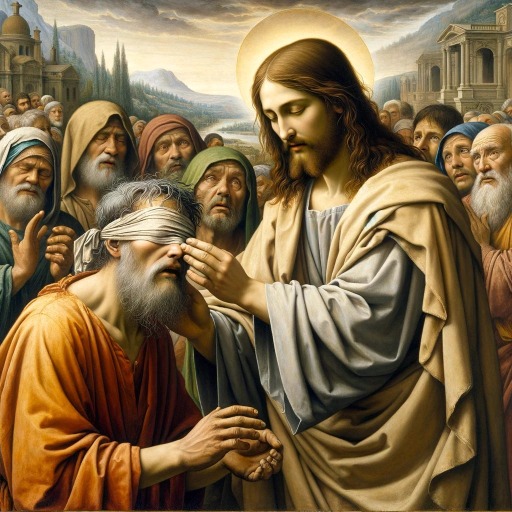 A. Jesus of Nazareth proved Himself a messenger of God by miracles and prophecies.
A. Jesus of Nazareth proved Himself a messenger of God by miracles and prophecies. A. Jesus of Nazareth proved Himself a messenger of God by miracles and prophecies.
A. Jesus of Nazareth proved Himself a messenger of God by miracles and prophecies.
Although Christ was infinitely greater than Moses and the prophets, yet He had this in common with them, that He came as a messenger of God. We shall, therefore, first consider Him under this aspect. If, in establishing the divine mission of Moses, we were entitled to appeal to his personal character to prove the absence of deceit, or to his teaching, which far surpassed the wisdom of his contemporaries, we are much more justified in doing so in regard to Christ, Who Himself challenged His enemies to convince (convict) Him of sin (John 8:46), Who preached a doctrine far surpassing all worldly wisdom. To gain our point the more easily and safely, we shall prove His divine mission chiefly by His signs and miracles.
Christ Himself appeals to His miracles as the most evident proof of His divine wisdom. When asked by St. John's disciples: Art Thou He Who is to come,
or shall we look for another?
Jesus, Who had just performed divers miracles, answered: Go and report to John what you have heard and seen: the blind see,
the lame walk, the lepers are cleansed, the deaf hear, the dead rise, the poor have the gospel preached to them
(Luke 7: 22).
He raised Lazarus to life in order that the bystanders might believe that the Father had sent Him (John 11: 42). He declared to all: These very works that I do,
bear witness to Me, that the Father has sent Me
(John 5: 36).
If, as we have shown in Issue No. 216, miracles and prophecies are evidence of the truth of the statement in confirmation of which they have taken place, the assertion of Christ that He was sent by God, in proof of which He so often and solemnly appealed to His miraculous works, receives a divine sanction, provided those miracles and prophecies were really such. But that they were true miracles and prophecies is beyond doubt.
I. That the extraordinary effects produced by Christ in animate as well as inanimate nature – in behalf of the sick, the possessed, and the dead – as related in the Gospel, were true miracles is evident:
1. From the assurance with which Christ Himself appeals to them, thus challenging investigation: If I do not perform the works of My Father,
do not believe Me. But if I do perform them, and if you are not willing to believe Me, believe the works, that you may know and believe that the Father is in Me,
and I in the Father
(John 10: 37-38).
2. From the conviction of the disciples, who fearlessly preached those facts as miracles and recorded them with all their circumstances, during the life of the eye-witnesses.
3. From the confession of the bitterest enemies of Our Lord, the scribes and Pharisees, who openly acknowledged that He did many miracles (John 11: 47).
4. From the acknowledgment of the later enemies of Christianity, for instance of Celsus, Porphyrius, Julian the Apostate; who being familiar with the philosophy and magic art of paganism, like the Pharisees, had recourse to the pretext that Jesus had worked miracles by the power of Satan. They did not reflect that he whom Christ dethroned, and whom He obliged to seek a dwelling in unclean animals, could not thus have worked his own destruction.
5. From the nature of the facts themselves, and the manner in which they were performed.
Jesus proved Himself Lord of inanimate nature. He multiplied substances when He fed five thousand men with five loaves and two fishes (Matt. 14: 17); and again four thousand with seven loaves and a few fishes (Matt. 15: 34); the tempests were instantly calmed at His word (Matt. 8: 26). What natural power could have produced such effects in such a manner?
Jesus proved Himself Lord of life and death. He raised Lazarus to life again after he had been four days in the grave (John 11);
by a single word He cured a man stricken with paralysis (Matt. 9: 6). If, at times, He used natural means to work cures,
as when He spread clay over the eyes of the man born blind, and commanded him to wash himself in the pool of Siloe (John 9: 6-7),
He did so chiefly to show that all nature was subject to Him. He proved that He did not require such means by frequently healing the sick by His word,
and by raising the dead to life. Thus He cured the ruler's son at a distance, by the words: Go thy way, thy son lives
(John 4: 50).
Has anyone ever by magnetic or other occult power in an instant calmed the winds and troubled sea, multiplied substances, raised the dead to life, or cured all manner of diseases? It would be wrong to infer from the occasional imposition of hands which Christ made use of that He employed magnetism or any similar means. The imposition of hands was a sacred rite; nor did Our Lord always employ it (Matt. 9: 6).
6. From the truthfulness, holiness, and wisdom of God. The more calmly and deliberately the contemporaries of Christ considered those facts, the more irresistibly were they drawn to recognize them as miracles, and, consequently, as proofs of His divine mission. God, Who is all-truthful, all-holy, and all-wise, could not, on the one hand, bestow upon an impostor a power by which men would be the more inevitably led into the most pernicious errors the more sincerely they inquired; nor could God, on the other hand, leave men bereft of the means of discovering the fraud and of escaping the toils of imposture. This, however, would have been the case if the miracles of Christ were only apparent miracles.
II. The supernatural character of Christ's prophecies is established with equal certainty. He frequently foretold future events.
Behold, we are going up to Jerusalem, and the Son of Man shall be betrayed to the chief priests and the Scribes; they will condemn Him to death,
and will deliver Him to the Gentiles to be mocked and scourged and crucified; and on the third day He will rise again
(Matt. 20: 18-19).
Among the prophecies of Jesus are that of His betrayal by Judas, the flight of the disciples, the threefold denial by St. Peter (Mark 14: 9).
History shows us how accurately these prophecies have been fulfilled.
It is evident that in these predictions there is question of free actions altogether unknowable by natural power.
For those events depended on the free will of the Jews, of Pilate, and the Romans, of the soldiers, of the disciples, of God Himself.
Jesus foretold events more in detail than the prophets, and thereby showed that He did not merely repeat their prophecies.
He foretold what was to come with the greatest assurance, making the belief in His divine mission dependent on His prophecies as well as on His miracles.
I tell you now before it comes to pass, that when it has come to pass you may believe that I am He.
(John 13: 19).
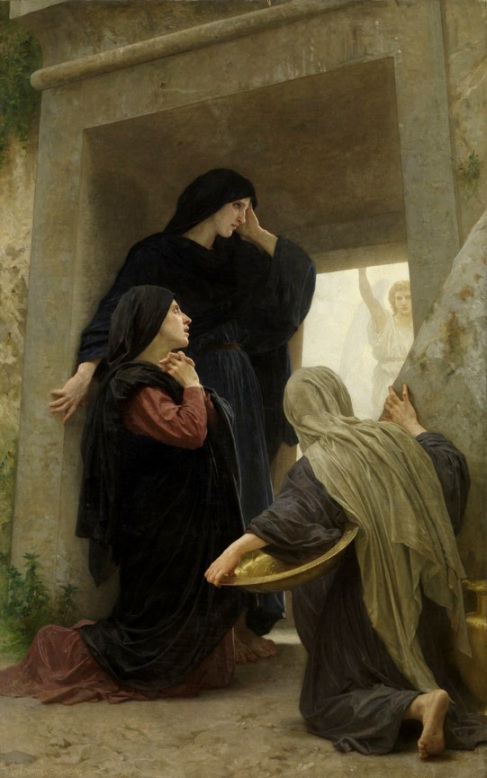 B. The divine mission of Christ is proved in particular by His Resurrection from the dead.
B. The divine mission of Christ is proved in particular by His Resurrection from the dead.
Since Our Lord wished, as it were, to summarize the proofs for His divine mission in the miracle of His Resurrection, it is fitting that we should also treat this fact as a proof comprising in itself all the other evidence for Christ's divine mission. And such it is in reality, whether we consider it as a miracle or as the fulfillment of prophecy.
I. The Resurrection as a miracle. Three things are to be established concerning this fact: (1) the fact itself, (2) its miraculous character, and (3) its value as evidence.
1. The Resurrection of Jesus Christ is an undoubted fact.
(a) It is proved by the most reliable witnesses.
As such must be reckoned the disciples of Christ, who preached the Resurrection before the world. Their truthfulness and sincerity are manifested in their whole conduct. Nor had they any motive for deceiving. They foresaw, and soon experienced, that their preaching the Resurrection of Christ would lead to persecution and death. Even had they wished, they could not deceive. It would have been impossible in so short a time, amidst such confusion, to unite on a common plan of action. Much less was it possible to execute such a plan without being betrayed by some of the many accomplices.
The circumstances under which Christ appeared after the Resurrection prove that the disciples themselves were not deceived.
He appeared not to a few, but to many; even to more than five hundred brethren at once
(1 Cor. 15: 6). He appeared not only once,
but repeatedly during forty days; not only in the darkness of night, but in the light of day. He ate with them, and showed them the prints of His wounds,
and commanded one of the disciples to touch them. So far were they from being over-credulous that the report of the women at first appeared to them as
idle tales (Luke 24: 11). They would hardly trust their own eyes (Luke 24: 37); and even those who were convinced by obvious proofs could
find no credence with their brethren (Mark 16: 13).
The murderers of Christ are witnesses to His Resurrection, in the first place, by their behavior towards the Roman guards. Instead of insisting upon the soldiers being tried and severely punished, they bribed them, that they might say that, whilst they were asleep, the disciples had stolen the body of Jesus. St. Matthew (28: 13), some eight years after the occurrence, before Jews and Romans, asserts this fact without fear of contradiction. Secondly, they render the same testimony by their behavior towards the disciples. Instead of bringing them to task and punishing them for this pretended crime, they merely imposed silence upon them (Acts 4: 18).
Finally, the entire world, by its faith in the Resurrection, bears witness to the same fact. But a few weeks after the event the Apostles preached the Resurrection, and based upon it the divinity of the Christian religion (Acts 2: 32). Forthwith three thousand profess their faith in the Resurrection, and the number of believers, and, consequently, of indirect witnesses to the divine mission of Christ, increased from day to day.
(b) Internal evidence manifestly shows that the disappearance of the body of Christ cannot otherwise be explained than by His Resurrection from the dead.
It is certain that Christ's body was really buried. The authors of the Gospels give detailed evidence of the fact; and the Jews demanded a Roman guard for the grave to prevent the possibility of deceit.
It is certain that Christ was really dead. Jews and Romans were convinced of His death. His enemies did not allow Him to be taken from the Cross alive. The opening of His side, and the flow of blood and water, removed the last shade of doubt concerning His death. Nor had the Jews at any time recourse to the subterfuge of an apparent death.
It is certain that Christ's body was not swallowed up by an earthquake. The winding sheets were left intact; and the cloth that had been about His head lay apart, folded up into one place (John 20: 7). Nor is there any trace of such an earthquake to be found.
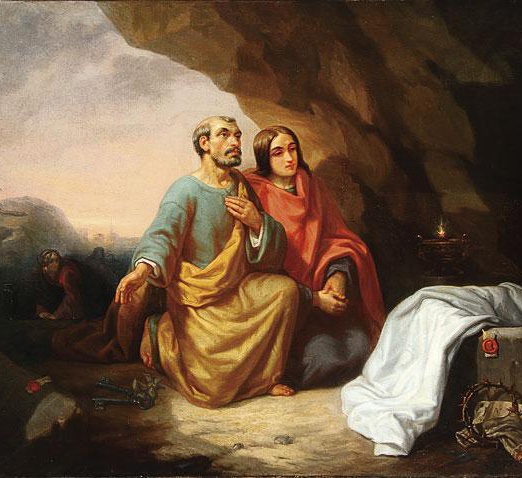 It is certain that Christ's body was not removed by the disciples. Their fear was manifestly too great; and if they had attempted such a thing,
they certainly would have been prevented.
It is certain that Christ's body was not removed by the disciples. Their fear was manifestly too great; and if they had attempted such a thing,
they certainly would have been prevented.
It is no less certain that the body had disappeared on the third day. In what manner? The admission of His Resurrection from the dead is truly the only explanation that involves no contradiction.
2. The Resurrection is undoubtedly a miracle. If a certain miracle is at all possible, the fact in question must be considered such; for it evidently leaves no room for reasonable or well-grounded doubt, but only for doubt which is unreasonable and groundless. The Resurrection is evidently a miracle, because it could not be effected by any created natural force, but only by divine power.
(a) That the resurrection of a dead person – that is, the reunion of the soul with the body – is beyond human power is evident from experience. And how could human activity, which can be exerted directly only on the body, and only indirectly through the body on the soul, recall the departed soul, over which it has no power, to its abandoned tenement?
(b) Nor can spirits, good or evil, raise the dead to life. For they have no power to withdraw the souls from the reward or punishment apportioned them by God at their departure from life, and to put them again in the state of probation. Moreover, the evil spirits, in particular, certainly possess no power over the souls or the blessed, who are entirely in the hands of God; and if the good angels have any such power it is only as the instruments of God, Who is Himself the chief agent.
3. The miracle of the Resurrection is undoubtedly evidence of Christ's divine mission. If God cannot possibly work miracles in favor of one who falsely pretends to be a divine messenger, this is most certainly the case when, as in the present instance, the miracle is most evident and the appeal to it most explicit.
Some of the scribes and Pharisees answered Him, saying: Master we would see a sign from Thee. Who, answering, said to them:
An evil and adulterous generation seeketh a sign; and a sign shall not be given it, but the sign of Jonas the prophet. For as Jonas was in the whale's belly
three days and three nights, so shall the Son of man be in the heart of the earth three days and three nights
(Matt. 12: 38-40).
Again, challenged by the Jews to prove His divine authority, Jesus said to them: Destroy this temple, and in three days I will rebuild it...
He, however, spoke of the temple of His body
(John 2: 18-21). The Jews understood and remembered these words. Therefore, wishing to frustrate the prophecy,
they demanded a guard to be stationed at the grave. We have remembered that that seducer said, while He was yet alive: After three days I will rise again
(Matt. 27: 63).
II. The Resurrection as the fulfillment of a prophecy. Our Lord could have appealed to His Resurrection as a summary proof of His divine mission, because it presented the double feature of a miracle and a prophecy, and thus comprised the sum-total of all evidence. In this case it will suffice briefly to consider the fact of the prediction, its character as a real prophecy, and its force as evidence.
1. His Resurrection was foretold by Christ in the presence both of His disciples (Matt. 20: 19) and of His enemies (Matt. 12: 38, 40). He predicted His Resurrection as often as He referred to it as evidence of His divine mission; whence the fact of the prophecy is manifest.
2. This prediction was real prophecy. Christ was certain that His Resurrection would take place on the third day; for He appealed to it expressly, and made the belief in His divine mission dependent on it. But it was only by supernatural means that He could foresee His Resurrection, since it depended altogether on the free action of God.
3. This prophecy is incontrovertible evidence of His divine mission. In proof of this assertion all those arguments may be adduced by which the convincing force of miracles and prophecies in general is established. But those arguments are the more conclusive in the present case because Christ Himself considers the prediction of His Resurrection alone as sufficient evidence of His divine mission.
C. Christ is the new law-giver and prophet promised by the Old Law.
The law of Moses was only to last until a promised law-giver and prophet should establish a new law and bring divine revelation to its completion. Christ in divers ways proves Himself to be that law-giver and prophet.
1. History testifies that Christ actually established a new law. For, after Christ the Christian law exists as a fact, as before Him the Mosaic.
In unmistakable terms He expresses His intention to found a new law. He is to remove the barrier that separates Jew from gentile, so that there will be but one
shepherd and one flock (John 10: 16). He perfects the Old Law by new precepts: It was said to your fathers... but I say to you...
(Matt. 4).
But as His mission was to fulfill what was prefigured, and to develop and perfect what was contained as in a germ in the Old Law, He could truly say that He
was come not to destroy, but to fulfill the law
(Matt. 5: 17). Hence it follows that He is the law-giver promised by Moses; for only one law-giver
is promised, and besides Christ no other arose in Israel.
2. It is manifest that Christ is the prophet like unto Moses promised in the Old Law and, consequently, the new law-giver; for all those features by which Moses is distinguished from the other prophets are strikingly verified in Him.
(a) Moses was a law-giver, which was the case with none of the other prophets. Christ alone resembles him in this.
(b) Moses distinguished himself by the miracles wrought by him in confirmation of the law he promulgated. Christ worked more miracles than all the other prophets, so that their very number characterizes Him as the prophet that was foretold (Matt. 11: 3,4).
(c) Moses conversed familiarly with God more than any other of the prophets (Num. 12: 6-8; Deut. 34: 10, 11). But Moses beheld only the emblem of God,
while Christ contemplated the essence of God. Of Him it is written: The only-begotten Son, Who is in the bosom of the Father, He has revealed Him (the Father)
(John 1: 18).
(d) Moses, moreover, distinguished himself as the deliverer of the people to whom he gave the law. But Christ was in a higher sense the deliverer
of the people to whom He proclaimed His law. He delivered them from sin, and could truly say: If therefore the Son makes you free, you will be free indeed
(John 8: 36).
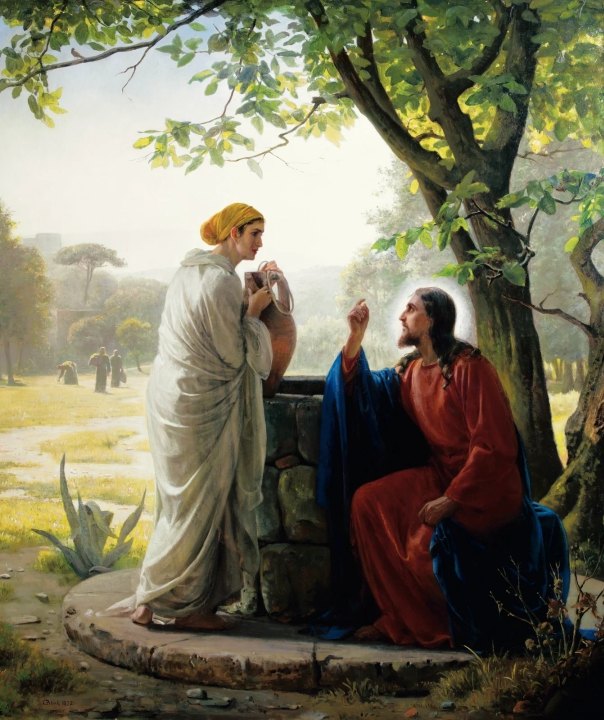 3. Jesus Christ declared in express terms that He was the prophet promised in the law, the Messias, and, therefore, the law-giver.
As the Samaritan woman who had recognized in Him an inspired prophet, Who knew the secrets of her heart, said to Him:
3. Jesus Christ declared in express terms that He was the prophet promised in the law, the Messias, and, therefore, the law-giver.
As the Samaritan woman who had recognized in Him an inspired prophet, Who knew the secrets of her heart, said to Him: I know that Messias is coming (Who is called Christ),
and when He comes He will tell us all things,
Jesus said to her: I Who speak with thee am He
(John 4: 25, 26). This explicit statement of Jesus,
that He was the Christ, the promised new law-giver, must, therefore, be received as an infallible truth, because He had by miracles proved Himself a messenger of God,
Who as such could only speak the truth.
D. Jesus Christ proved Himself to be the true Son of God.
The divine origin and, consequently, the truth of the religion of Christ has been sufficiently established by the foregoing proofs; for a religion proclaimed by a true messenger of God is, by that very fact, divine. But the divinity of our religion appears in still clearer light when it is shown that its Founder was the Son of God, and, therefore, God Himself. Of the numerous proofs for the divinity of Christ we shall select only those that may be established on the truths already demonstrated.
We must lay down as a fundamental principle that whatever a divine envoy asserts in regard to the substance of the religion he announces is sealed with the divine authority. If the messenger of God asserts that he is the Son of God, God Himself, this truth, doubtless, belongs to the substance of the religion he proclaims; for, in this case, he must be worshiped as God. Since, therefore, the divine mission of Christ has been established, and thus His statements regarding His religion are stamped with the seal of divine authority, there remains only the question: whether Christ in any way declared Himself to be the Son of God.
Viewing the matter from a merely natural standpoint, if Christ declared Himself to be the Son of God, we are placed in the alternative either to consider Him as true God or to regard Him as the most criminal of men; for the greatest of all crimes is falsely to assert one’s self as God. Now, all men, even His enemies, acknowledge Christ to have been of a wise, upright, and blameless character; therefore they cannot logically doubt of the truth of His statement when He says He is the Son of God.
1. Christ expressly declares Himself to be the true Son of God, consequently, God Himself.
(a) When the Jews reproached Him for working miracles on the Sabbath, He answered that He, as the Son, had the same power as the Father.
My Father works even until now; and I work.
This, then, is why the Jews were seeking the more to put Him to death; because He was not only
breaking the Sabbath, but was also calling God His own Father, making Himself equal to God. In answer therefore Jesus said to them: Amen, amen, I say to you,
the Son can do nothing of Himself, but only what He sees the Father doing. For whatever He does, this the Son also does in like manner...
For as the Father raises the dead, and gives them life, even so the Son also gives life to whom He will… For as the Father has life in Himself,
so He has given to the Son also to have life in Himself... You have sent to John; and he has borne witness to the truth... The witness, however,
that I have is greater than that of John. For the works which the Father has given Me to accomplish, these very works that I do bear witness to Me,
that the Father has sent Me
(John 5: 17-36).
The words of Christ can have no other meaning than that which the Jews really attributed to them. If it were not evident in what sense He called Himself
the Son of God, all doubt is removed by His appeal to the testimony of John the Baptist. For John had said: This is He of whom I said,
'After me there comes one Who has been set above me: because He was before me...' And I have seen and borne witness that this is the Son of God
(John 1: 30-34).
Jesus was before John only because, as God, He was from all eternity. Christ Himself, far from giving any other meaning to His words, or calling Himself the Son of God
in a metaphorical sense, confirmed the truth of His assertion. The Jews had taken offense at His words; yet Jesus only renewed the assertion that God was His Father,
and Himself the Son of God, by attributing to Himself the same power as the Father. For whatever He (the Father) does, this the Son also does in like manner.
Now, only He Who is almighty does in like manner what God the Father does; and only He Who is almighty and God Himself can, like the Father, give life to whom He pleases.
Christ acknowledged only one distinction between Himself and the Father, namely, that of person.
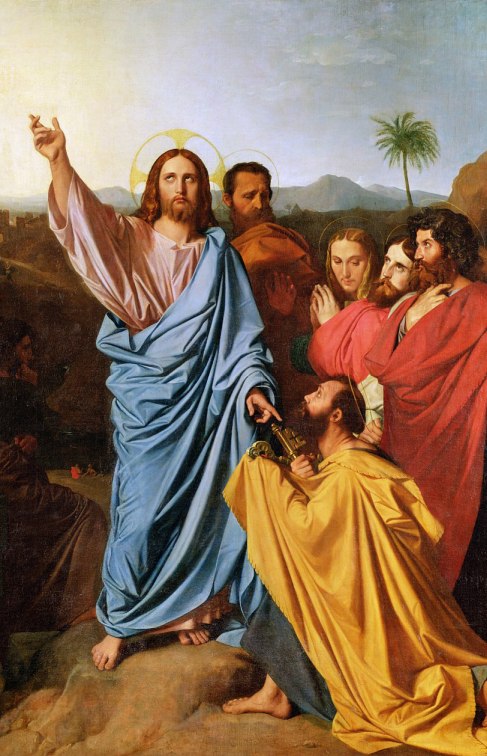 (b) Christ approves and commends the faith of Simon Peter, who, by divine inspiration, clearly and definitely recognized in Him the true Son of God.
(b) Christ approves and commends the faith of Simon Peter, who, by divine inspiration, clearly and definitely recognized in Him the true Son of God.
When, in answer to His question: Who do men say that the Son of Man is?
the Apostles replied: Some say, John the Baptist; and others, Elias;
and others, Jeremias, or one of the prophets,
Jesus continued: But who do you say that I am?
Simon Peter answered and said, Thou art Christ,
the Son of the living God.
Then Jesus answered and said, Blessed art thou, Simon Bar-Jona, for flesh and blood has not revealed this to thee, by My Father in Heaven
(Matt. 16: 13-17).
(c) Jesus declared solemnly, before the tribunal, that He was indeed the Son of God, in the true sense of the word – He Who sits at the right hand of the Father, i.e., Who has the power of God – He Who shall come in the clouds of heaven to judge the world. He is accused of blasphemy because, being questioned if He is Christ the Son of God, He answered in the affirmative (Matt. 26: 64-66). Moreover, He was declared worthy of death because He made Himself the Son of God (John 19: 7).
2. Jesus attributed to Himself the attribute of eternity, and declared that He proceeded from the Father – that is, that He was the Son of God, God Himself.
They therefore said to Him, 'Where is Thy Father?' Jesus answered, 'You know neither Me nor My Father. If you knew Me, you would then know My Father also...
For from God I came forth and have come: for neither have I come of Myself, but He sent Me… Abraham your father rejoiced that he was to see My day. He saw it and was glad.'
The Jews, therefore, said to Him, 'Thou art not yet fifty years old, and hast Thou seen Abraham?' Jesus said to them, 'Amen, amen, I say to you, before Abraham came to be, I am.'
They therefore took up stones to cast at Him; but Jesus hid Himself, and went out from the temple.
(John 8: 19-56)
Jesus plainly affirmed His divinity when He said that He was before Abraham and from eternity; for the whole unchangeable past and future is implied in the
words I am.
It was because of this plain language that the Jews resolved to stone Him. Nor did Jesus correct them as having misunderstood His words which He certainly
would not have failed to do in so important a matter, if they had actually mistaken His meaning. It is clear, therefore, in what sense Jesus said that He had
come forth
from, and was sent
by, the Father, namely, by generation; in which sense He calls God His Father.
3. Jesus declared that He has the same nature as God the Father.
Challenged by the Jews to say frankly whether He was the Christ, Jesus answered them, 'I tell you and you do not believe. The works that I do in the name of
My Father, these bear witness concerning Me... My sheep hear My voice, and I know them and they follow Me. And I give them everlasting life... What My Father has given Me is
greater than all; and no one is able to snatch anything out of the hand of My Father. I and the Father are one.' The Jews then took up stones to stone Him.
Jesus answered them, 'Many good works have I shown you from My Father. For which of those works do you stone Me?' The Jews answered Him, 'Not for a good work do we stone Thee,
but for blasphemy, and because Thou being man, makest Thyself God.' Jesus answered them, 'Is it not written in your law, I said you are gods? If He called them gods to whom
the word of God was addressed (and the Scripture cannot be broken), do you say of Him Whom the Father has made holy and sent into the world, 'Thou blasphemest,' because I said,
'I am the Son of God?' If I do not perform the works of My Father, do not believe Me. But if I do perform them, and if you are not willing to believe Me, believe the works,
that you may know and believe that the Father is in Me and I in the Father.' They sought, therefore, to take Him; but He escaped out of their hands.
(John 10: 25-39)
This oneness of nature of the Father and the Son and Their consequent unity of will is to be the model of charity between His followers; and, therefore, Christ prays to the Father
that His disciples may be one, as He and the Father are one (John 17: 11).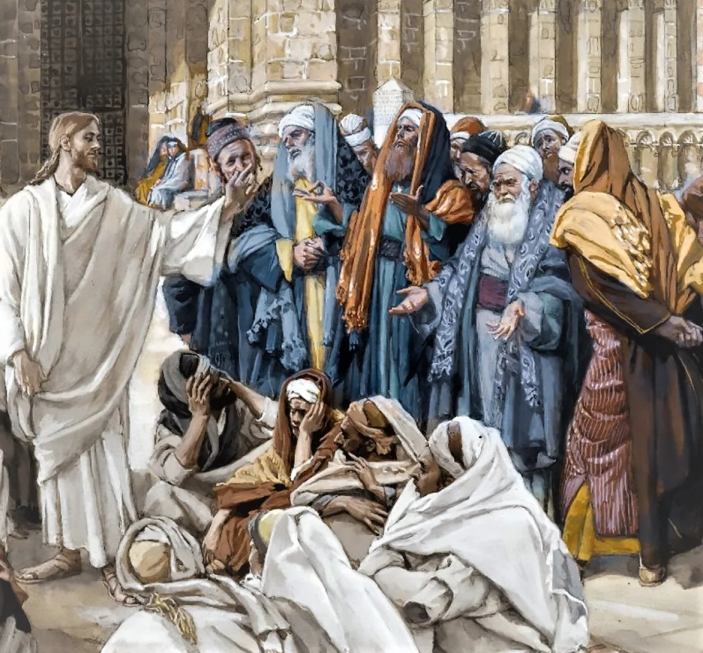
4. Apparent contradictions in other passages are easily explained if we only attend to the circumstances in which the words were spoken.
(a) Sometimes Christ attributes divinity to the Father alone; not, however, in contradistinction to the Son, but to false gods.
Now this is everlasting life, that they may know Thee, the only true God, and Him Whom Thou hast sent, Jesus Christ.
(John 17: 3)
From the fact that the pagan gods are not true gods it does not follow that Jesus Christ is not true God. Moreover, it is expressly asserted in the text that the
knowledge of the Son, as well as that of the Father, is life-giving.
(b) When Christ says: The Father is greater than I
(John 14: 28), He speaks of Himself as man. There is question here of His
returning to His Father. As man He also prays to His Father and is obedient to Him.
(c) When He says that it is not His, but His Father's, to grant to the sons of Zebedee to sit at His right hand or His left (Matt. 20: 23),
He means that it was not His by that title under which it was asked, i.e., the title of kindred; but that this favor depended upon God's decree.
Elsewhere He expressly says that to Him is given all power in Heaven and on earth
(Matt. 28: 18).
(d) It was only in His capacity of envoy of God that He was ignorant of the day of judgment (Mark 13: 32); as the messenger of God He was not empowered to reveal this truth, though He knew it as the Judge of the living and the dead.
(e) By the words: Why dost thou call Me good? No one is good but God only
(Luke 18: 19), Jesus would only lead the young man in the
Gospel to the knowledge of His divinity; as if He would say: If I am good, as thou callest Me, know, then, that I am God.
E. The divinity of Christ is proved by the preaching of the Apostles.
Here two questions come under discussion: (1) what authority is to be attributed to the teaching of the Apostles, and (2) whether the Apostles preached the divinity of Christ.
I. The authority of the teaching of the Apostles may be considered under a twofold aspect – a natural and a supernatural – according as we regard its resting on natural or supernatural grounds.
1. Considered from a merely natural standpoint, the teaching of the Apostles concerning the person of Christ must be regarded as of the greatest weight. For if we may in any case argue from the teaching of the disciples to that of the master, we may safely do so in the present instance, since Christ appointed His Apostles as the heralds of His doctrine. He must, therefore, have carefully expounded to them the meaning of the fundamental dogmas of His religion, to prevent the baneful consequences which would else ensue. If, then, anyone had the facilities of conceiving rightly of the doctrine of Christ, it was certainly His Apostles, who constantly conversed with Him during His public life. Nor had any others, to the same extent, occasion to convince themselves of the truth of Christ's doctrine by His miracles as the Apostles had, being constant witnesses of His actions.
2. The teaching of the Apostles possesses a still higher authority if we consider it from a supernatural standpoint.
(a) By the very fact that Christ gave to His Apostles the same mission which He Himself had received from His Father (John 20: 21) they were made partakers of the magisterial power of Christ, their Head. Hence the miracles and prophecies which prove the divinity of Christ's teaching no less confirm the teaching of the Apostles. Without further supernatural facts, therefore, the teaching of the Apostles rests upon the same divine evidence as the divine mission of Christ Himself.
(b) The Apostles themselves, by numerous miracles, prove their divine mission, as well as the truth of their own and Christ's doctrine,
the meaning of which they rightly understood after the descent of the Holy Ghost. They went forth and preached everywhere, while the Lord worked with them and
confirmed the preaching by the signs that followed.
(Mark 16: 20) That which is here summarized we find fully explained in the Acts of the Apostles.
The first appearance of the Apostles on the day of Pentecost was attended by miraculous facts, in consequence of which, on that very day, three thousand souls
were added to the Christian fold. And fear came upon every soul; many wonders also and signs were done by means of the Apostles in Jerusalem.
(Acts 2: 43)
II. That the Apostles did preach the divinity of Jesus Christ is evident from numerous passages in their writings.
1. According to the teaching of the Apostles, Jesus Christ is the true Son of God, and God Himself.
(a) St. John, whose Gospel was especially intended to refute Cerinthus, who had denied the divinity of Christ, begins by establishing this fundamental doctrine.
In the beginning was the Word, ...and the Word was God.
(John 1: 1) Christ, the Word made man, is, therefore, called God in the strictest sense.
(b) We know that the Son of God has come and has given us understanding, that we may know the true God and may be in His true Son.
He is the true God and eternal life.
(1 John 5: 20) Christ, the true Son, is, therefore, true God.
(c) From whom [the Israelites] is the Christ according to the flesh, Who is over all things, God blessed forever, amen.
(Rom. 9: 5)
(d) In words no less evident, the Apostle St. Thomas confessed his belief in the divinity of Christ when, beholding His glorious wounds, he exclaimed:
My Lord and my God
(John 20: 26).
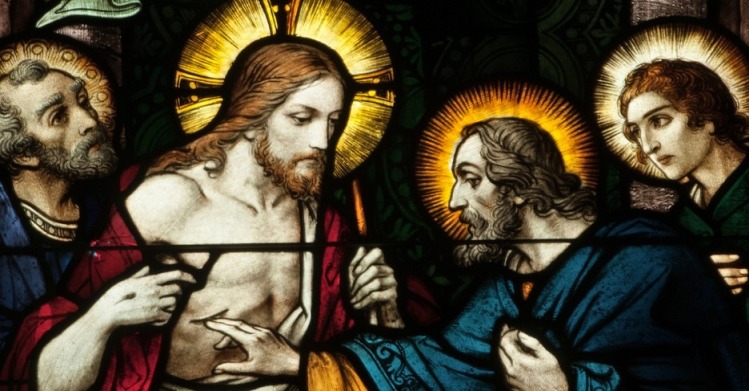
2. According to the teaching of the Apostles, Christ possesses divine attributes and the very fullness of the Godhead.
(a) He [the Word] was in the beginning with God. All things were made through Him, and without Him was made nothing that has been made.
(John 1: 2,3)
Here eternity and omnipotence are plainly attributed to Christ.
(b) In like manner, St. Paul teaches that by Him and in Him all things are created and consist (Col. 1: 16, 17); and that He upholds all things
by the word of His power
(Heb. 1: 3). Christ is, therefore, the Creator and Preserver of the world; consequently, omnipotent.
(c) In Him dwells all the fullness of the Godhead bodily
(Col. 2: 9); i.e., not apparently, but in reality.
3. The Apostles attribute to Christ divine nature, and represent Him as equal to the Father.
Who though He was by nature God, [He] did not consider being equal to God a thing to be clung to, but emptied Himself, taking the nature of a slave and being made
like unto men. And appearing in the form of man...
(Phil. 2: 6, 7) By the nature of a slave is here meant human nature; and, consequently, by the nature of God,
the divine nature. Christ was like to men by His human nature; therefore He is also said to be like to God by the identity of His nature with the divine nature.
F. The entire chain of revelation possesses a remarkable coherence, each link bearing a threefold evidence.
Such, by God's providence, is the coherence of revelation from the origin of the human race to the time of the Apostles that (1) every link bears its own evidence, (2) that every preceding link proves the divinity of the following, and (3) that every succeeding one, in turn, bears witness to the supernatural character of the foregoing.
1. That every link of revelation bears in itself the evidence of its divinity we have seen from the miracles that attended each single phase. We called attention to the miracles attending the Mosaic and the Christian revelations; but God gave also to the patriarchs by miraculous facts, and to our first parents by His visible converse, evidence of His supernatural communications with them.
2. That the Mosaic revelation, which comprehends also the revelations made to our first parents and to the patriarchs, bears witness to the divinity of the Christian revelation follows from the promise of a future law-giver. Since Jesus Christ alone possessed the marks given by Moses, He alone is the promised law-giver. In like manner, the divine mission of Christ was a warrant for that of the Apostles, who continued His work. Hence every foregoing revelation is, consequently, evidence of the succeeding.
3. We may convince ourselves of the divine origin of Christianity by beginning with the last link of the chain, the miracles of the Apostles, which are evidence of their divine mission, or, in fact, with those miracles which in later times testified to the truth of Christianity; the Apostles and the Church of succeeding centuries, as divinely accredited messengers, proclaiming to us the divine mission of Christ and the truth of His entire doctrine. Again, Christ, thus approved as a divine teacher, shows us the divine mission of Moses, and the divine origin of the Mosaic Law; for He appeals to the Law and to Moses, who had written of Him (John 5: 46). Moses, on his part, proves the divinity of the patriarchal and of the primitive revelations. Hence each link is evidence of the foregoing.
Thus it is manifest that each link in the chain of revelation carries with it a triple evidence of its divinity.
Alphabetical Index; Calendar List of Saints
Contact us: smr@salvemariaregina.info
Visit also: www.marienfried.com